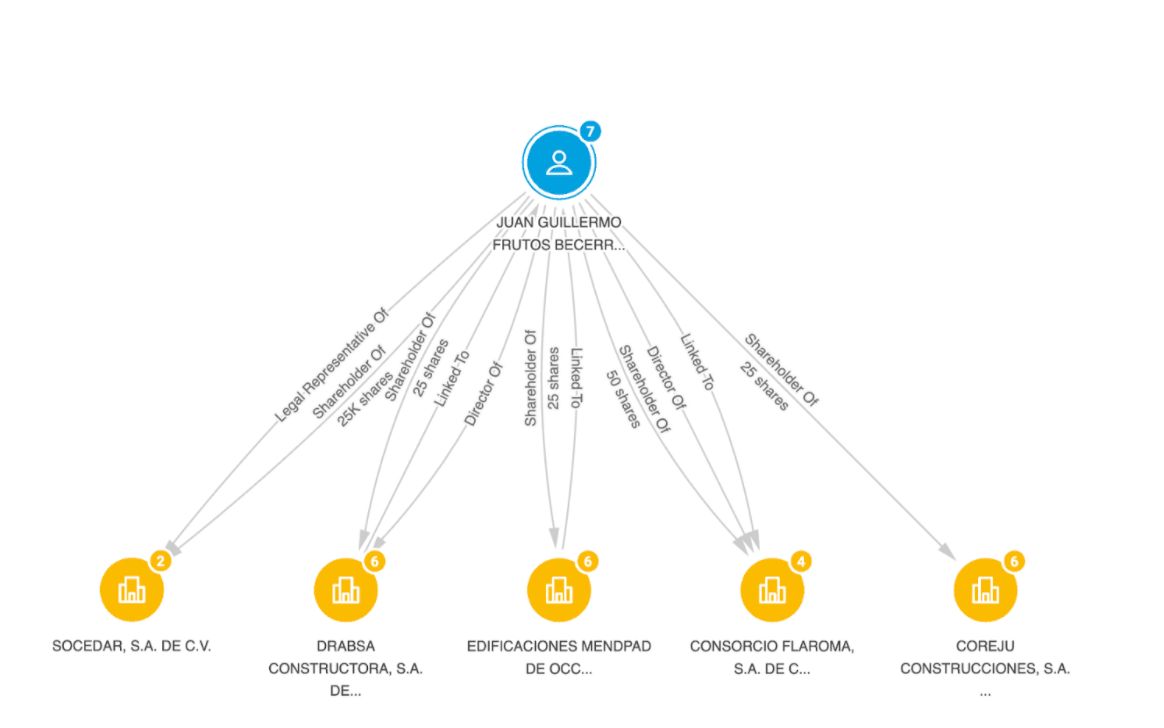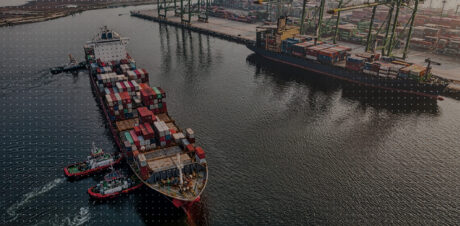The freezing of nearly 2,000 bank accounts last year with alleged ties to Mexico’s Jalisco New Generation Cartel (Cártel Jalisco Nueva Generación, CJNG) suggests that Mexican authorities may be upping the pressure on the organization’s finances. Mexican corporate records show that some of these bank accounts are associated with individuals and companies with ties to entities previously sanctioned by the U.S. for money laundering, as well as other nefarious financial activity in Mexico.
As this case demonstrates, corporate records can provide both law enforcement and financial institutions the insight and context necessary to either further an investigation, or identify broader avenues of potential client risk.
Mexico’s FIU targets bank accounts allegedly linked to the CJNG
Last June, Mexico’s Financial Intelligence Unit (UIF) announced that it had blocked 1,939 bank accounts allegedly linked to the CJNG, one of Mexico’s most prominent transnational criminal organizations. 1,770 of the bank accounts were reported as belonging to natural persons, 167 belonged to legal entities, and two belonged to trusts.
The operation — titled Blue Agave (Agave Azul) after the specific species of agave plant used to produce tequila — identified scores of companies and individuals that have allegedly assisted the CJNG in laundering money, including companies operating in the tequila, construction, financial services, agricultural, and medical supply industries, among others.
To be sure, it is relatively common in Mexico for authorities to freeze suspect bank accounts to probe financial flows. Since the beginning of current President Andrés Manuel López Obrador’s tenure in December 2018, Mexico’s FIU has frozen over 17,000 bank accounts associated with various criminal organizations, according to Contralínea. More than half of these accounts are allegedly linked to the CJNG.
Medical supply companies and ties to sanctioned entities
As part of Operation Blue Agave, Mexican authorities publicly identified two medical supply companies whose bank accounts have been frozen for allegedly being used to launder money on behalf of the CJNG.
A review of Mexican corporate records demonstrates that the two businesses are linked to a broader network of entities previously sanctioned by the U.S. Treasury Department’s Office of Foreign Assets Control (OFAC) for their alleged ties to Los Cuinis, a money laundering group associated with the CJNG.
The two companies — Med Ahead S.A. de C.V. and MH Excelencia Medica S.A. — specialize in selling medical equipment. Both entities have, in recent years, been awarded public contracts from various state governments to provide medical supplies.
While the ownership and control of both companies may seem innocuous at first glance, a closer examination using Mexican corporate records reveals direct links to other entities and individuals allegedly associated with the CJNG’s money laundering operations.
Med Ahead is owned by María Eugenia Gómez Urbano and Ana Esperanza Ramírez Nuño, according to records from the Jalisco state corporate registry. María Gómez is also the owner of Intercorp Legoca, S.A. de C.V. and has power of attorney for Step Latinamedica S.A. de C.V. — both companies were sanctioned by OFAC in 2015 and 2016, respectively, for their alleged connection to money laundering operations on behalf of Los Cuinis.
Ana Ramírez, for her part, has power of attorney of MH Excelencia Medica, one of the medical supply companies whose bank accounts were frozen as a result of Operation Blue Agave.
Phantom companies and the diversion of public funds
The related parties of other entities whose bank accounts were blocked by the Mexican authorities have also been connected to other dubious financial schemes, including the suspicious diversion of millions of dollars in public funds from the country’s health sector.
Like the medical supply companies mentioned above, Mexican authorities also froze the bank accounts of a number of construction and gasoline supply companies, including Drabsa Constructora S.A. de C.V., Edificaciones Mendpad de Occidente S.A. de C.V., and Consorcio Flaroma, S.A. de C.V. All three companies share the same co-owner — Juan Guillermo Frutos Becerra.

Fig. 1: A Sayari Graph snapshot of part of Juan Guillermo Frutos Becerra’s corporate network.
Juan Frutos also previously served as the majority shareholder of now-defunct Corporativo Begonia, S.A. de C.V., a Guadalajara-based information technology firm.
In November 2018, Corporativo Begonia was added to the Mexican tax authority’s phantom company blacklist (SAT Article 69-B). The 69-B blacklist is reserved for legal and natural persons that have issued invoices without having a valid address, infrastructure, personnel, or assets to conduct legitimate business. Fake invoices, along with the individuals and entities that supply them, provide an effective means to evade taxes, embezzle from state coffers, or launder money.
Not only was Corporativo Begonia added to the Mexican front company blacklist, but the company was also awarded over $5 million in public contracts between 2014 and 2018 from government entities operating in the health sector, according to a report published last year by Impunidad Cero, an anti-corruption organization. In total, the report identified more than $200 million diverted from government coffers via fake invoices, raising serious questions as to the ultimate beneficiaries of those funds.
Juan Frutos appealed the decision by the Mexican FIU to freeze his companies’ bank accounts, however it’s unclear whether a decision was made on that appeal, and/or if the bank accounts remain frozen.
Mexican authorities up the pressure on the CJNG
Operation Blue Agave falls within a string of actions taken by Mexican authorities in an attempt to curb what has been a seemingly undeterred expansion by the CJNG in recent years. While its influence varies greatly across the country, the CJNG is present in virtually every state except the Golden Triangle states of Chihuahua, Durango, and Sinaloa, according to InSight Crime, an investigative outlet that specializes in organized crime in Latin America.
Beyond drug trafficking, the CJNG maintains a diverse criminal portfolio that includes extortion, fuel theft, and human trafficking.
In July 2020, Mexican authorities — acting on an extradition request from the United States — arrested Rubén Velázquez Aceves, alias “El Ingeniero,” in Zapopan, Jalisco. Velázquez — who has been on U.S. authorities’ radar for years — is a high-ranking CJNG member who oversaw drug distribution networks in California, Illinois, and New York, according to the U.S. Drug Enforcement Administration (DEA).
He has been charged with money laundering and drug trafficking in the Southern District of California, according to Proceso.
Velázquez also left a corporate footprint in Guadalajara, a city long considered an epicenter of money laundering in Mexico. Between 2005 and 2007, he opened seven companies, including a car wash business, three real estate and construction businesses, a gasoline supply business, and a marketing firm. All seven companies are technically still active; however, at least six of them are currently in the process of liquidation, according to the Jalisco state corporate registry.
Velázquez also served as a shareholder of a public transport company that, in 2005, was authorized by the Jalisco state government to run a public transportation route in Guadalajara.
While Velázquez’s direct participation in the operations of his licit and illicit businesses will be significantly curtailed given his arrest, his business associates — some of which are likely family members — maintain ties to additional active companies operating in many of the same industries.
Interestingly, the legal representative of at least five companies tied to Velázquez’s business associates also has power of attorney of a Guadalajara-based construction company linked to Salvador Ascencio Chávez, an alleged high-ranking member of the Sinaloa Cartel.
Salvador Ascencio’s involvement in drug trafficking runs deep. In 2019, he was identified by Italian police in a sweeping investigation that has shed light on how the Sinaloa Cartel operates in Italy, as an emissary to help broker a cocaine deal with the ‘Ndrangheta, an Italian transnational criminal organization.
The link between Velázquez and Asencio’s networks, albeit indirect, serves as yet another example of how the borders of criminal networks — especially money laundering networks — are often blurred. As Mexican and U.S. authorities continue to ramp up pressure on the CJNG, broader insight into the group’s illicit financial operations and their relationships to other criminal organizations, can provide law enforcement with the context necessary to better target and combat various echelons of these



